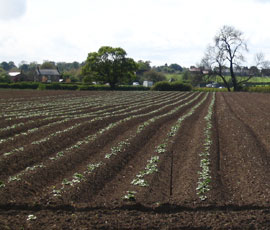Export growth vital for Scots potato seed business

Securing the recent growth in Scottish seed potato exports was as important as looking to develop new markets, Mark Prentice, the Potato Council’s head of seed and export told growers at Potatoes in Practice held near Dundee.
Total seed exports had smashed through the 100,000t barrier after a 10-12% increase over the past two years, he said. “It is a real success story for the potato industry. We have seen significant increases in tonnages being exported, but we need to protect that growth.”
Around three-quarters of those exports were to non-European Union destinations, with 75% heading to just three countries: Egypt, Israel and Morocco.
But there were significant challenges in maintaining exports, said Robert Burns, potato export liaison officer for the Scottish government agency, Science and Advice for Scottish Agriculture (SASA).
Importing countries frequently changed their importing conditions, often tightening restrictions or bringing in new legislation, he said.
For example, Egypt had wanted to insist exporting countries had ring rot and brown rot pest-free area status, Mr Prentice said. “But that was impossible to achieve as the pest-free area had to be the whole of the EU, so we managed to persuade the Egyptian authorities to drop the condition.”
Developing relationships with importing country officials through inward and outward mission visits were a key step in helping negotiate successfully and secure markets, he added. “For example, Egypt has a definitive cut-off date for when exported seed has to be shipped by, which coincided with the very cold period last winter. We managed to secure a 10-day derogation without which we would have lost the market.”
Building those relationships had also allowed Mr Burns to sit as an expert in discussion with Egyptian officials over this season’s import conditions, and influence terms, including pushing back from an initial nil tolerance to soft rots to a 0.1% tolerance.
Currently, import conditions were standard for all exporting countries, Mr Prentice said. “But in the future we may seek to get bi-lateral agreements.”
That could help with meeting the Egyptian’s fears over Dickeya solani infections, which was at the heart of their demand of zero tolerance to soft rots, he suggested. “Scotland could offer freedom in place of production status for dickeya.”
Similar relationships with officials in Israel, Morocco and Turkey were also paying off, Mr Prentice said. Trials were ongoing in Morocco to help convince officials to remove a silver scurf tolerance restriction, while some headway had been made in Turkey over virus testing, which had been a barrier to growth in Scottish exports to that country, he said.
China was an obvious target for growth, he added. “It has a 3m tonnes/year requirement for seed potatoes, and has a big issue with seed quality. Just getting a small proportion of that market would be nice.”
Import conditions were currently being discussed, he added. “It wants a nil tolerance for silver scurf, which we can’t sign up to, but we’re negotiating.”
More Potatoes in Practice articles:
Potato seed blackleg rejections double
Speedy PCN soil testing introduced
Rogueing seed potato crops cost industry £300,000
Diquat SOLA to help control of potato dumps

